Nationally recognized for student experience
The Wall Street Journal

Bachelor of Science (B.S.)
Minor
Human Development and Family Science
Strengthen communities and shape lives for the better with a bachelor’s degree in human development and family science from Bowling Green State University.
This is a degree for people who care about people. Human development and family studies is about supporting individuals, families and communities as they navigate life’s challenges and celebrate its joys. Students explore the complexities of human growth, relationships, education and family dynamics across the lifespan.
Graduates empower vulnerable populations and promote greater health and well-being by creating, spotlighting and delivering on initiatives that help people live fuller, happier lives.
It’s a broad discipline and offers many career paths. Most human development and family science jobs are community-based, typically with nonprofits, community agencies or state and local governments.
Human development and family science is also available as a minor.
Why study human development and family science at BGSU in Ohio?
- Be part of something bigger. Our graduates are leaders in community outreach, youth development, family and community development agencies, long-term care and assisted living facilities, early intervention and family life education.
- Real-world experience that makes a difference.
- Every year, human development and family science interns collectively contribute more than 17,000 hours to local, national and international organizations like United Way, Adopt America Network and American Red Cross.
- Students learn the art of active listening at the Listening Post, a campus-based HDFS mental health and wellness initiative that invites individuals to talk with students about what’s on their minds. Nearly 10,000 individuals have been heard since the program started.
- In-demand field. The Bureau of Labor Statistics reports the occupational outlook for social and community service managers is expected to grow nearly 10% over the coming years – much faster than the average profession.
- Caring, connected faculty. Your success is important to us. Faculty members have a range of professional expertise and ongoing involvement in local, regional, state and national services, government agencies, advisory boards and professional organizations.
- NCFR certification. Our HDFS program has received approval from the National Council on Family Relations (NCFR) for the Certified Family Life Educator (CFLE) – a valuable credential for many employers. Upon graduation, students are eligible for provisional CFLE designation pending a fast-tracked formal certification process.
- Research that counts. Collaborate in ongoing faculty research or gain funding for your own through the Center for Undergraduate Research and Scholarship. Past HDFS research projects have included:
- Explorations of grandparents raising grandchildren
- The impact of media on relationships
- How to encourage more civic-minded students
#1 public university in Ohio for career prep
The Wall Street Journal
Career - what can you do with a human development and family science degree?
Because the degree is designed to be versatile, human development and family science jobs run the gamut.
Some of the most common employment avenues for HDFS graduates include:
- Community-based education and social services. These include positions like certified family life instructor, parent educator, volunteer coordinator, adoption or foster care specialist, case manager or case worker, crisis hotline coordinator or college student academic advisor.
- Family support/prevention/intervention. Professionals on this track may become conflict/divorce mediators, family coordinators, adult day care professionals, public health program coordinators, activities coordinators, early intervention specialists, prenatal/maternity support services professionals or hospice workers.
- Consumer and family resources services. Help people better manage their money as an employee assistance specialist, consumer affairs specialist or family financial specialist.
- Government and public policy. Be a voice for the vulnerable as a victim’s advocate, child advocate, services investigator or family policy analyst.
This is just a glimpse of the professional possibilities with this degree. We can say with certainty that BGSU graduates get good jobs. Alumni surveys indicate more than 92% of graduates are employed in their major area. About a third go on to pursue advanced degrees, most commonly in counseling, student college personnel, physical/occupational therapy and gerontology.
Career paths
- Family life educator
- Community outreach
- Human and social services
- Social and community service managers
Quick Facts from the Bureau of Labor Statistics
96% of human development and family science graduates report they’re employed, in graduate school or starting a business within six months of graduation.
Minor in HDFS
The minor in human development and family science is designed to offer students an introduction to family studies courses and provide a broad understanding of human development across the lifespan. Students gain a greater understanding of contemporary family systems, as well as individual and family development.
A minor in HDFS can often strengthen your marketability in other fields, such as:
- Criminal justice
- Communication
- Ethics studies
- International studies
- Gerontology
- Psychology
- Public health
- Social work
- Sociology
- Women’s, gender and sexuality studies
Curriculum
Our students have a keen interest in understanding the complexities of human behavior, relationships and social dynamics. We prioritize a comprehensive education that blends theoretical knowledge and classroom collaboration with practical experience that prepares students to step directly into their chosen professions.
Many of those with a human development and family science major round out their education with a minor in a complimentary field such as gerontology, health promotion, psychology, sexual studies or sociology.
Alternatively, they can select a cognate area, a cluster of courses that narrows one’s focus on a specialized area of interest. For example, a student interested in becoming a youth support specialist may choose cognate coursework in areas like juvenile delinquency, drugs/alcohol, family stress or trauma-informed practice.
HDFS majors often choose to minor in child development or child life.
By the time they graduate, students can:
- Evaluate empirical and theoretical knowledge of lifespan human development and family science in an inclusive and trauma-informed framework.
- Apply a strengths-based approach to enhance opportunities for individuals, families, communities and cultures.
- Interpret research and theory to optimally inform practice when working with individuals, families and communities.
- Analyze the role of family resources, policies and advocacy for the well-being of individuals and families across the lifespan.
- Utilize professional competencies based on ethical standards, best practices and effective communication strategies.

Sample courses
- Family Interaction
- Listening Post
- Family Diversity
- Trauma-Informed Practice
- Children and Families Under Stress
#1 university in Ohio – big or small, public or private – students would choose again
The Wall Street Journal
The human development and family science program is part of the School of Applied Human Development in the BGSU College of Education and Human Development.
Accreditation
Bowling Green State University [BGSU] is accredited by the Higher Learning Commission. BGSU has been accredited by the Higher Learning Commission since 01/01/1916. The most recent reaffirmation of accreditation was received in 2022-2023, with our next reaffirmation of accreditation scheduled for 2032-2033. Questions should be directed to the Office of Institutional Effectiveness.
Request Information
*Source: O*NET Program, sponsored by the U.S. Department of Labor/Employment and Training Administration(USDOL/ETA) through a grant to the North Carolina Department of Commerce.
Updated: 12/04/2025 08:19AM

